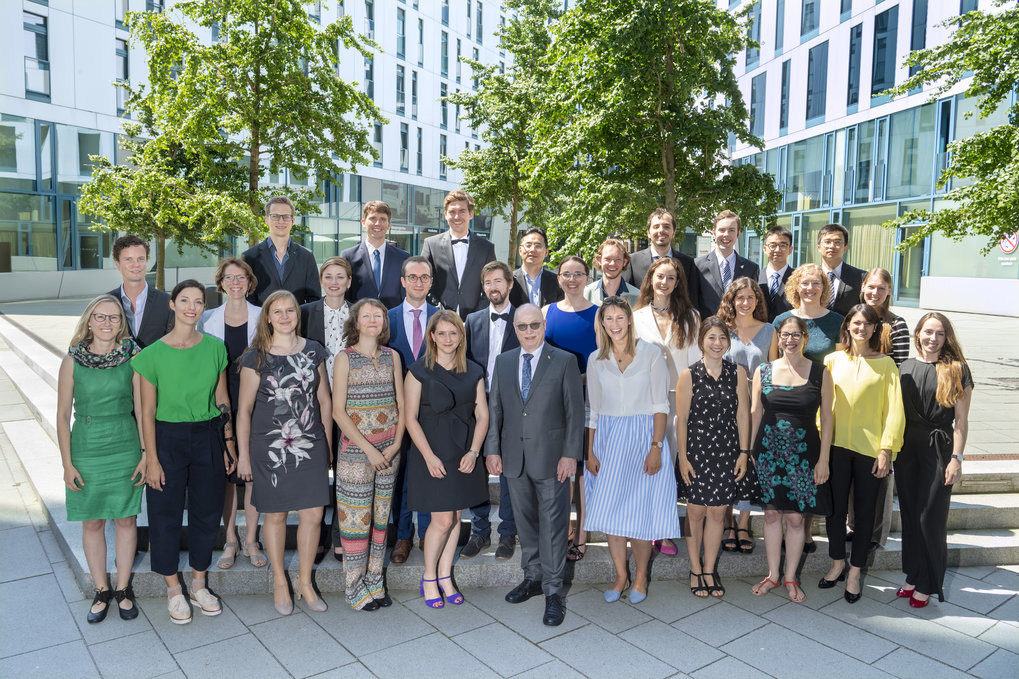The MPG's 70th Annual Meeting places its thematic focus on "Europe"
From June 25 to 27, 2019, the Max Planck Society will convene in Hamburg for its 70th Annual General Meeting. In addition to the Directors of the Max Planck Institutes and the Society's Supporting Members, the research organization's key decision-making bodies will also assemble. The closing plenary assembly will focus on the challenges and opportunities for science arising from current upheavals in Europe. The keynote presentation will be given by the German-British historian Kiran Klaus Patel from the University of Maastricht on the topic "Europe in turmoil: Lessons from the History of European Integration".

The thematic focus of the MPG's 70th Annual General Meeting in Hamburg is placed on "Europe".
The Max Planck Society expects around 700 participants from science, politics and industry to attend its annual meeting. Among the prominent guests are Peter Tschentscher, First Mayor of the Free and Hanseatic City of Hamburg, Dieter Lenzen, President of the University of Hamburg, Venki Ramakrishnan, Nobel Laureate and President of the Royal Society, as well as Maciej Żylicz, President of the Foundation for Polish Science. "In 2019, the University of Hamburg is celebrating its 100th birthday. On the occasion of this special anniversary, we were happy to accept the invitation to host this year's annual meeting in the Hanseatic city," so Max Planck President Martin Stratmann.
Strong networks in Hamburg
The Max Planck Society maintains three institutes in Hamburg: the scientists of the Max Planck Institute for Meteorology, the Max Planck Institute for Foreign and International Private Law, and the Max Planck Institute for Dynamics and Structure of Matter are closely involved in the research structure of the region, in in addition to enjoying strong international networks.
"Hamburg-based Max Planck Institutes are involved in two of the four clusters approved as part of the Excellence Strategy: 'Climate, Climatic Change, and Society' as well as 'Advanced Imaging of Matter" continued Max Planck President Martin Stratmann. According to Stratmann, this is a sign perfect interplay between university and non-university research.
Kick-off in the University of Hamburg's Ernst Cassirer auditorium
The annual meeting will open with the presentation of the Stifterverband Science Prize 2019 at the University of Hamburg. Every two years, the Stifterverband für die Deutsche Wissenschaft and the Max Planck Society award the prize, which is endowed with 50,000 euros, to basic research projects that have been successfully put into practice.
On the two following days, the committees of the Max Planck Society will meet high above the rooftops of the Hanseatic city in the Emporio Tower of Hamburg. In addition to the Senate and the Executive Committee, these are the Sections that discuss, amongst things, the appointment of further scientific members. The panel will also adopt the 2018 Annual Report.
Plenary assembly with a thematic focus on Europe
The plenary assembly will take place on Thursday evening in the Altona fish auction hall. After speeches by Peter Tschentscher, First Mayor of the Free and Hanseatic City of Hamburg, and Martin Stratmann, President of the Max Planck Society, Kiran Klaus Patel of the University of Maastricht will give a speech on "Europe in turmoil: Lessons from the History of European Integration". The subsequent panel discussion will also revolve around the future of Europe, with top-class protagonists of European science: Venki Ramakrishnan, President of the Royal Society, and Maciej Żylicz, President of the Foundation for Polish Science.
About the Max Planck Society
At 86 Max Planck Institutes and research facilities, scientists are conducting basic research in the natural sciences, life sciences, and humanities. The Max Planck Society has produced 18 Nobel Prize winners from its ranks since its inception in 1948. The MPG is the international flagship of German research: as well as five Institutes abroad, it operates 20 Max Planck Centers with partners such as Princeton University in the USA, Science Po in France, University College London / UK, and the University of Tokyo in Japan. Funded in equal measure by the Federal and State Governments, the Max Planck Society had a basic budget of around 1.8 billion euros in 2018. (Personnel figures as of 31.12.2018)






